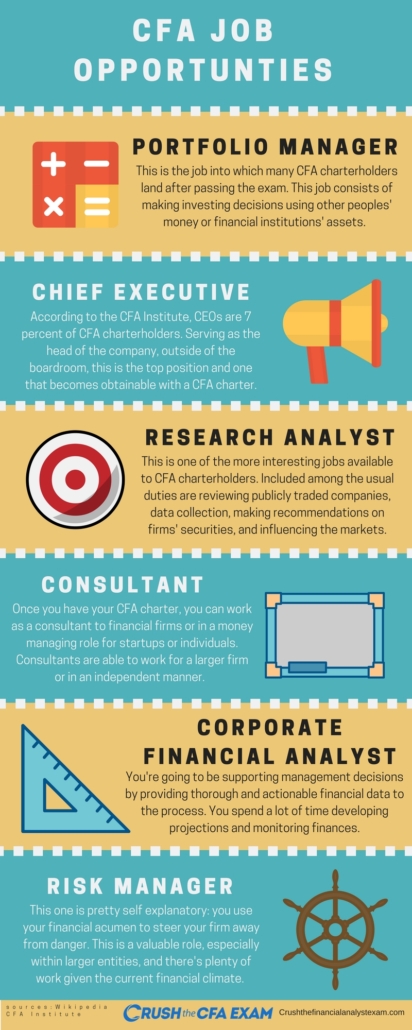![]() It’s easier to see the light at the end of the tunnel if we understand exactly from where that illumination comes. In other words, knowing what jobs are open to CFA® charterholders makes studying for the levels of the exam a little easier.
It’s easier to see the light at the end of the tunnel if we understand exactly from where that illumination comes. In other words, knowing what jobs are open to CFA® charterholders makes studying for the levels of the exam a little easier.
I passed each section of the CFA®, but I knew WHY I was taking the test in the first place. I had a role at my company for which I wanted to be qualified, and getting the CFA® accreditation was the only thing standing between me and that position (which came with a considerable raise).
So, let’s walk through the great and high-paying jobs that are open to charterholders to help make studying for the CFA® exam a little easier.
Portfolio Manager
Okay, so this is the most common destination for charter holders. After passing the exam, almost a quarter of CFA® accredited financial employees will end up as portfolio managers—that number changes, but it’s generally true, according numbers from the CFA® Institute.
What exactly does this role entail? Basically, this is a research-intensive position for people who are well organized and able to understand both general and specific market trends. The size of the firm will dictate whether you’re going to deal with a single fund or a larger investment group. Regardless of the size of the fund, however, you’re going to be speaking with other researchers, handling clients, meeting with internal analysts, studying the markets, and finally making investment decisions.
This is a role that will be a mainstay in the investment industry for years to come, with an expected uptick in employment growth seen by the Bureau of Labor Statistics.
Chief Executive
Well, this role is pretty self explanatory, as it’s usually seen as the non-board member pinnacle of every company. Having a CFA® accreditation won’t guarantee you this corner office, but it will definitely be a solid foundation on which to build your case for securing that role.
Most CEOs of reputable companies have some type of certification, accreditation, or advanced degree. While many people think the MBA is the overpowering initialism to throw after their name, some could argue that the CFA® is harder to get. Given the total amount of studying time, the more concentrated nature of the test, and the fact that you likely are studying while working full-time, passing all three levels of the CFA is more than enough to land qualified candidates the CEO job.
Research Analyst
This is a job that’s similar to the portfolio manager in that it requires a significant amount of research, but it’s more intensive and less management based. Instead, you’re doing most of the data culling and leg work. People who favor doing cerebral work that will get used to make larger decisions outside of their own office will love this position.
If you land this job, your analysis will be used to make recommendations on trades and securities. Though you’re not going to be the one who is pulling the levers at your firm, your research and effectively your word will influence the stock market. Based on your input, stock valuations and futures will fluctuate—that’s quite a bit of power.
Because of this, the Securities and Exchange Commission is heavily involved in this sector of the financial industry, which again highlights the importance of this role. Within this title there are three potential areas of operation: you’re either going to be buy-side, sell-side, or working through independent analysis. Based on this designation, you will see your level of influence on the market or clients vary significantly.
Consultant
Consulting work varies quite a bit from industry to industry, and oftentimes will be quite different within certain sectors of the financial world. If you have relevant employment experience and have passed all three levels of the CFA® exam, you will have quite a few opportunities to do some consulting work.
Although the CFA® is geared toward portfolio and asset management, there’s opportunities outside of this specific area of operation. Even within that specific sector, however, there’s still plenty of roles for you if you prefer the consulting-type of role.
Corporate Financial Analyst
This position is extremely important, as it basically ensures that a business is operating in a manner that maximizes profit and solvency. This role would require a you to analyze past and present data, incorporate projected performance numbers, and then measure this information against that of competitors and the market as a whole.
Think of this role as the sonar operator on a submarine. You’re not the captain or the head of personnel, but you’re going to make sure you avoid problem areas, stay abreast of enemy positions, and are preparing the vessel for immediate action. Those who pass all three levels of the CFA® will be able to make quite an impact on any company in this role. Passing all three levels often requires taking a review course. Check out our exclusive CFA® discounts and start preparing today!
Risk Manager
Like the corporate financial analyst, this role will ensure that the company stays afloat. This role requires you to use your specific training and your CFA® knowledge to assess potential risks and implement strategic planning to minimize potential losses for a given company.
There are a number of things that a Risk Manager needs to monitor, including regulations, internal risky behavior, and employee trends.
Now that you know the job opportunities that are waiting for you, take the first step in becoming a CFA® with one of the best CFA® review courses!



